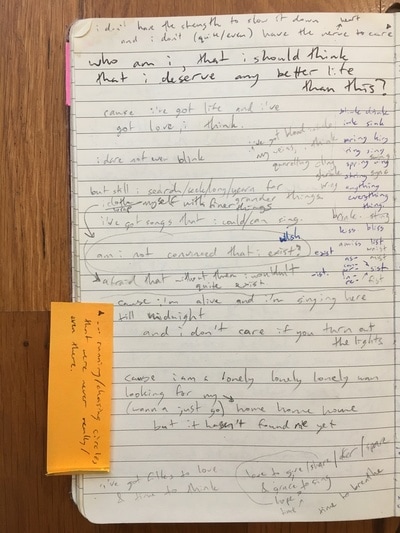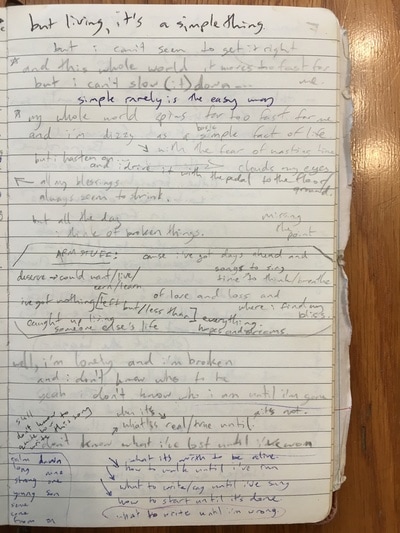|
We are warmed by the fire, not by the smoke of the fire. We are carried over the sea by a ship, not by the wake of a ship. So too, what we are is to be sought in the invisible depths of our own being, not in our outward reflection in our own acts. We must find our real selves not in the froth stirred up by the impact of our being upon the beings around us, but in our own soul which is the principle of all our acts.
― Thomas Merton, No Man Is an Island
<
>
Who am I that I should think
That I deserve any better life than this? 'Cause I've got love to share and hope to sing And grace enough for every chance I might have missed. But still I find myself convinced I'm not enough, That I should fill all the emptiness inside; But things of earth below and sky above Have yet to satisfy my fearful pride. Well, I'm lonely and I'm broken And I don't know who to be And I don't know who I am until I'm gone. Well, living, it’s a simple thing, But I just can’t seem to get it right, 'Cause my whole world spins far too fast for me And I’m dizzy as a simple fact of life; But I don’t have the strength to slow it down, And I don’t even have the heart to care, And I never had the patience for it anyhow, So I race on just as fast as I can bear. Well, I'm lonely and I'm broken And I don't know who to be And I don't know what I’ve lost until I’ve won. Oh, well, who am I? Am I hiding in here somewhere? Am I lost enough to cry for help tonight? Oh, God, can you find me in here anywhere? Will you lead me to myself and give me life? 'Cause I’m lonely and I’m broken And I don’t know what you see, But when I’m lost I find I’m found here in your love. Performers: daniel couper - Vocals & Acoustic Guitar Colin Jeffress - Piano & Cello
Having been met with freeing grace in the bishop's garden, Jean Valjean hastily departs in a haze of fear and confusion. After a long day spent fleeing the oblivion that threatens to overtake his mind and spirit, Valjean seeks shelter in a thicket by the side of the road, vaguely hoping to elude this newfound freedom. Utterly disoriented, he instinctively steals a coin from a young boy who passes by. Some minutes or hours later, when the chill of the night air suddenly snatches him from his stupor, Valjean discovers his theft and is seized by a violent remorse. With the nervous aimlessness of an escaped convict fleeing capture, he vainly seeks his victim. In his frantic search, Valjean encounters a priest, gives him nearly everything in his purse (“For your poor,” he says), and demands to be arrested. The unsettled minister flees this erratic lunatic, leaving him alone once more in the dark, his cheeks wet with the pent-up tears of nineteen years.
This is where “Simple Thing” finds us, bewildered by an unexpectedly disturbing experience of grace, betrayed by the apparent simplicity of that “be yourself and love.” While the previous song makes a feeble attempt at deconstructing the popular notions of “be yourself,” this song even more feebly attempts to reconstruct that disintegrated self. “Who am I?” is the central question here. How am I supposed to be myself if I if I can’t find myself? In the quote above, Merton speaks of the human soul as a ship in motion, leaving a wake in its absence. Perhaps, for our purposes, it would be more fruitful to imagine a submarine, navigating just below the surface of the water. As we stand at the water’s edge, unsure of what lies within, we witness the impression left by the vessel. Given the disposition of our scientific age and the desire to remain quite dry, our natural response is to examine the wake itself, the visible impact of the submarine on its surroundings. By careful analysis of the data, one could presumably determine the size, shape, speed, depth, and direction of the mysterious object. Indeed, with the proper tools, one could trace with precision the object’s movement across an entire ocean without once dampening a finger. The one unfortunate stipulation which binds this method of discovery is that it can only provide knowledge about the past. By the time we see the wake, the ship has moved on. The effects of the “principle” are only made manifest and measurable in its absence. I don’t know who I am until I’m gone. The easiest way to know myself is to see what has been done and to determine the causes, the motivations, the characteristics which describe the person who has done it. Hindsight is 20-20, as they say. But in looking back, I cannot actually be myself. I am not present with myself. Instead, I become the comfortable, dry, inquisitive scientist above the water, measuring the effects of some mysterious entity on its environment. And I am already gone. Filled with curiosity and good intentions, I come to know a great deal, but it is a shallow knowing, a fact or action knowing, the sort of knowing the French would call savoir and the Spanish, saber. I have figured myself out, as one figures out the answer to a math problem. I don’t know who I am until I’m gone. In order to truly know myself, as one might know a sibling or a friend, I must enter the murky water. I must leave my dry scientist behind and become familiar with the mystery of myself. There is an element of relationship and love in this sort of knowing, this connaitre or conocer, that can never be attained by close examination alone. The complexity of analyses and conclusions must give way to the simplicity of being, loving, knowing. But simplicity is very rarely easy. Plunging into the water provides no immediate answers. A moment ago, in the open air, I knew a great deal. But I have abandoned all of that. My eyes shut tightly against the burning salt water. My ears clog and perhaps begin to ache. All my senses are numb. I am desperately lost and frighteningly vulnerable in the deep. Having calculated this to be my fate, should I enter the water, I hesitate in the boat above. I cannot meet this fate on my own. I decide it would be best to stay dry. Then, even as I turn away, an impulse comes from beyond myself and throws me into the water. Was I pushed? Was I pulled? Did the boat lurch? Whatever it was, it was grace. This is what happens to Jean Valjean when the Bishop purchases his freedom for him with cutlery and candlesticks. Valjean is cast into the water against his will, along with the rest of us. At first, we rage against the futility of our senses, against the unknown force which thrust us hence, against our own powerlessness and bewilderment. But, as we gradually begin to make peace with the waters which envelop us, we come to a vague sense of something significant. There is something beyond ourselves, and it sees us, knows us, loves us. And we are part of this significance, somehow. We have not yet discovered ourselves, perhaps―we certainly have nothing to report to the scientific community―but we have begun to be ourselves. We have no answers, but we are beginning to ask the right questions.
1 Comment
|
This page is sort of a catch-all for the things that don't quite fit anywhere else, kind of like that "miscellaneous stuff" drawer in your kitchen. Some of it is definitely just junk. Some of it is incredibly precious. Hopefully, this blog―with its song stories and random ramblings and who knows what else―will contain more of the latter. Peace.
Keep in touchIf you like what you're reading (or hearing), subscribe below to stay up to date with new posts and other music related tidings.
Categories
All
Archives |


 RSS Feed
RSS Feed